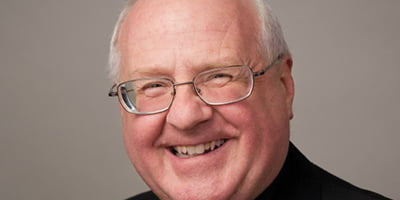
Father Mark Goldasich is the pastor of Sacred Heart parish in Tonganoxie. he has been editor of the Leaven since 1989.
by Father Mark Goldasich
Sua Sponte.
Let me start by apologizing for using a Latin phrase for the second column in a row. I can’t help myself. I recently came across a story that I just couldn’t keep to myself. And it just happens to hinge around sua sponte.
Tom Allen tells the story, which was triggered by the 1998 movie “Saving Private Ryan.” I have to admit that I’ve never watched that movie all the way through. Its opening scene, which shows Army Rangers taking Omaha Beach on D-Day, is perhaps one of the most gruesome — and I suspect — realistic depictions of the reality of war. That scene lasts about a half-hour, and I’ve never been able to sit through it; the horror is just too much for me. I’ve watched most of the rest of the movie but can’t take that first part.
In any event, Allen is a former Army Ranger and was pastor of Grace Church Seattle. He said that he was proud as he watched the Rangers in that movie. You might remember that the film is about a group of them, led by Capt. John H. Miller (Tom Hanks), that embarks on a mission to go deep into enemy territory and bring back Private Ryan, whose other three brothers have already been killed in the war. When they finally find Ryan, after a number of battles and the loss of several of the Rangers, he refuses to come with them.
Ryan knows that a big battle is coming up and doesn’t want to leave his fellow soldiers. In a nutshell, the Rangers stay and fight a horrific battle and almost everyone dies, except Ryan. Hanks’ character is sitting on the ground, wounded and dying, and says to the private, “Earn this.” Basically, Hanks meant that many men died to save Private Ryan and he needs to live a life worthy of that sacrifice.
It’s here that Pastor Allen said he got upset. He contends that no Ranger would ever say, “Earn this.” That’s because the Ranger motto for the past 200 years is “Sua sponte,” which means, “I chose this” (literally, “of one’s own will”). In other words, all of those Rangers volunteered for the mission. Pastor Allen said that Hanks’ character, if he were a true Ranger, might have said, instead, “Sua sponte. I chose this. This is free. You don’t pay anything for this. I give up my life for you. That’s my job.”
Pastor Allen says that’s what we should think of when we look upon Jesus on the cross. Jesus doesn’t say to us, “Earn this.” Instead he says, “Sua sponte.” Jesus volunteered for it; we don’t have to pay anything. (Adapted from “Perfect Illustrations for Every Topic and Occasion,” edited by Craig Brian Larson and Drew Zahn.)
Wow. That’s a powerful way to look at Jesus, not just on the cross, but all through his public ministry. His love, his preaching, his healing — all were freely given. Jesus was the exemplar of what sua sponte entails.
At the Last Supper, in the Gospel of John, Jesus washes the feet of his disciples. Then he says to them, “I have given you a model to follow, so that as I have done for you, you should also do” (13: 15). The example of Jesus is something to follow — not out of obligation, but out of love. Even the times where Jesus says, “Follow me,” it’s an invitation, not a command. Our following of Jesus, if genuine and effective, must be sua sponte, of one’s own will, done freely and out of love.
Perhaps those two Latin words can transform the “duties” that we perform on a day-to-day basis. Although the phrase won’t make the task necessarily any easier, it can give our actions a deeper meaning. Choosing to sacrifice some of our time or our energy freely for the sake of another, without expecting anything — not even “thanks” — in return, can be tremendously freeing and fulfilling . . . and a way to grow in becoming more like Christ.
Sua sponte can give strength in situations that would normally try your patience, such as:
• changing an infant’s diaper for the umpteenth time
• listening to an elderly person tell you the same story for the fiftieth time or answering the nonstop questions of an inquisitive child
• driving the kids to yet another ballgame . . . on the other side of the world . . . in the blazing heat
• doing the laundry or cooking or cleaning . . . again and again and again.
The next time you’re tempted to roll your eyes and sigh in frustration, roll up your sleeves instead and whisper to yourself, “Sua sponte.” You’ll make Jesus very proud.

